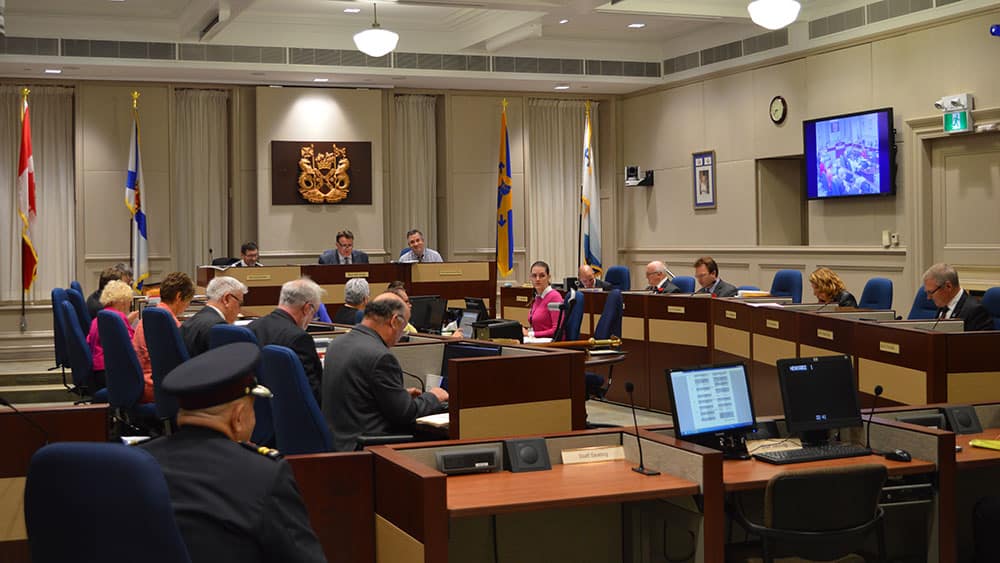
The Signal
This column originally appeared in the Halifax Examiner June 25, 2018.
“We don’t build buildings because of public opinion.
We build them for good planning…
And so I think this is a good thing for us…
In terms of the design, I think we’ve mitigated most of the concerns…”
—Councillor Shawn Cleary
June 19, 2018-06-22
 Shawn Cleary’s suitcase of sophistry requires a little unpacking.
Shawn Cleary’s suitcase of sophistry requires a little unpacking.
Councillor Cleary is correct. Halifax city council doesn’t OK new buildings on the basis of public opinion. More often than not, it approves new developments in spite of thoughtful, articulately expressed public opposition to them.
That was certainly the flashing-neon case last week when council again said yes-sir-how-high to Armco’s latest proposal to erect a 25-storey tower at the Willow Tree corner of Quinpool Road and Robie Street.
But that doesn’t, ipso facto, make Cleary’s next sentence — “we build them for good planning” — true.
Far from it.
In fact, council’s decisions often run counter to good civic planning. That’s why councillors so frequently have to torture logic to explain their one more one-off exceptions to existing planning regulations. And why they must now regularly twist themselves into air-filled balloon animals just to explain away each additional exception-to-the-last-exception decision they made. See, for example, Cleary’s own developer-favourable, Centre Plan-contrary calculation of how many affordable housing units Armco would need to include in the Willow Tree project to win council’s blessing to add more-than-the-permitted number of storeys to its looming tower. Hint: not nearly as many as the Centre Plan would require of it.
Memo to Shawn Cleary: professional city planners have consistently recommended against Armco’s various applications to build higher and higher.
“And so I think this is a good thing for us,” Cleary continues.
Define “good.”
Define “us.”
Cleary might also want to seek a second, third, even one-hundredth opinion on his bold assertion council has now “mitigated most of the concerns” citizens had about the wisdom of approving the Armco proposal.
So, if it wasn’t about public opinion and it wasn’t about good planning, why did Shawn Cleary and nine fellow councillors — Steve Streatch, David Hensebee, Bill Karsten, Tony Mancini, Russell Walker, Steve Adams, Richard Zurawski, Matt Whitman and Steve Craig — vote to support a development proposal so many citizens oppose? Including, of course, many of the residents in the neighbourhood Shawn Cleary represents, which is where the tower is slated to rise.
The easy answer might be to look at who donated how much to whom in the last municipal election. Hendsbee, Mancini, Streatch, Walker and Whitman all received donations from Armco Capital. Hendsbee and Walker received additional campaign funding from Geosam Capital, another developer-connected company.
But nothing is ever as simple as it seems. Mayor Mike Savage, whose campaign received $2,500 from Geosam, voted against the Armco proposal. And Cleary — council’s most vocal proponent of the Willow Tree Tower development and its developer — made a public point during the last election of not accepting donations from any developers.
“When those councillors are picking a contractor, should the contractor be allowed to donate?” he had asked rhetorically at the time, adding that the lack of campaign finance laws made politics in Halifax “like the wild west.”
Cleary is now among those pushing for a campaign finance bylaw — Halifax currently has none — that would set out candidate spending limits, determine who is eligible to contribute and how much, and require transparency about who gives what to whom.
Although city spokesperson Brendan Elliott tells me “it’s our hope to have a proposed bylaw in front of the executive standing committee, a subcommittee of regional council, in the fall [and] fully our intent to have [a new campaign finance bylaw] in place before the 2020 election,” the timeline in a May 2017 staff report shows the getting-to-an-actual-bylaw process is already a year behind schedule — with the clock tick-tocking inexorably toward a next municipal election in 2020.
We shall see.
Although the CBC calculated that 17 per cent of all campaign donations in the last election came from developers — with more than 10 per cent of that total donated by Armco-related companies alone — it isn’t just about who contributes to election campaigns.
There is also the issue of whose voice gets heard — and listened to.
As is the case with campaign financing, Halifax conveniently has no rules governing lobbyists’ activities.
Consider Joachim Stroink, the former Liberal MLA who now carries the lofty title of director of government relations and stakeholder engagement for Armco Capital. Which makes him a lobbyist. He isn’t registered — there is no registry — and he isn’t required to report his meetings with council or staff. Yet part of his job has been to convince city councillors they should ignore the city’s existing height restrictions and forget demanding the more expensive height-for-affordable-housing trade-offs in the draft Centre Plan — and just say yes to the Armco dress.
One of the councillors Stroink lobbied, of course, was Shawn Cleary. Cleary and Stroink have a long personal friendship — and a history. In 2013, Cleary served as Stroink’s campaign manager in his successful bid to become an MLA.
Could he…? Did that…?
“In Halifax, it’s one-and-a-half degrees of separation,” Cleary dismissively dismissed any suggestion of a conflict to The Coast. “Everybody knows everybody.”
Ironically — or perhaps not, given those one-and-a-half degrees of separation — Cleary is also the key councillor pushing for the “creation and maintenance of a municipal lobbyist registry.” A follow-up staff report to his 2017 motion on the matter is expected to land on the desk of council’s executive standing committee sometime this summer.
Our Coun. Cleary is clearly a complicated, sometimes contradictory fellow. Like the rest of us.
It will be interesting to see how his constituents parse all those contradictions when they are asked to mark their ballot in the 2020 municipal election.





 STEPHEN KIMBER, a Professor of Journalism at the University of King's College in Halifax and co-founder of its MFA in Creative Nonfiction Program, is an award-winning writer, editor and broadcaster. He is the author of two novels and eight non-fiction books. Buy his books
STEPHEN KIMBER, a Professor of Journalism at the University of King's College in Halifax and co-founder of its MFA in Creative Nonfiction Program, is an award-winning writer, editor and broadcaster. He is the author of two novels and eight non-fiction books. Buy his books
Won’t be voting for Cleary next time!